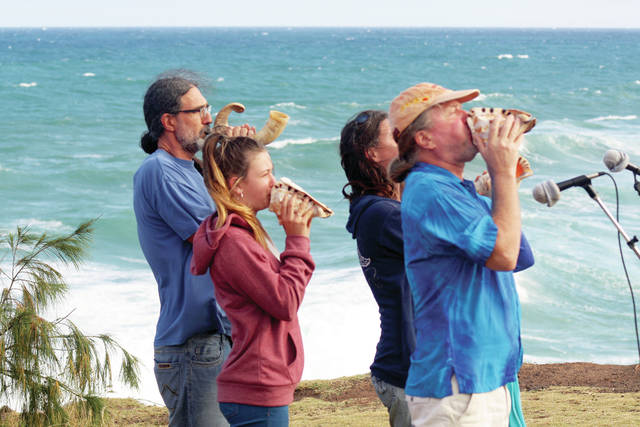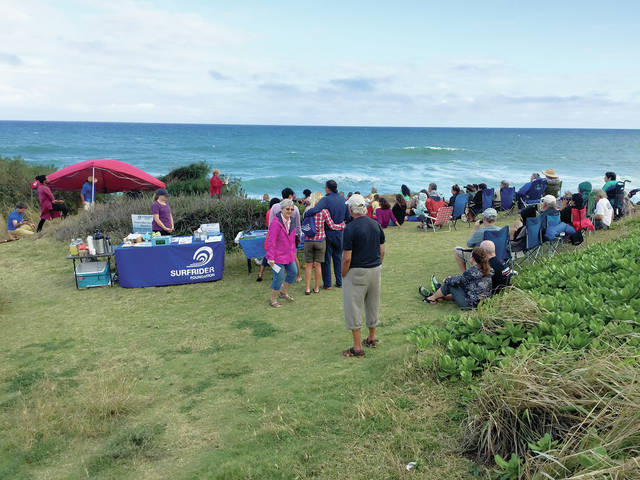KEALIA — The whales have returned to Hawaii, and 100 people welcomed them back on Saturday at the Kealia Bluff Lookout by sharing songs, poems, prayers and whale stories at an open mic event.
“We gather every year to celebrate the whales home to Hawaii as they are very special to so many for a variety of reasons,” said event organizer Kalasara Setaysha. “It helps us all feel connected and reminds us how lucky we are to share the world with such intelligent, gentle beings and how important it is to care for each other and the oceans.”
The annual North Pacific humpback whale migration is one of the longest of any mammal, at nearly 6,000 miles for the round trip.
The whales visit Hawaiian waters each year from November to May with the peak of the season from January to March.
These majestic mammals leave waters around Alaska in the fall, swimming for about six to eight weeks before reaching their winter Hawaiian home where they procreate, give birth and nurse their young.
“Our event is really quite simple, but at the same time, quite powerful,” said Gordon LaBedz for Kohola Leo-Whale Voice, sponsors and co-producers of the event. “As the whales jump and breach, their friends on the shore give tribute by singing a special song, playing an instrument, chanting, dancing or telling their stories about their relationship with the whales.”
This is the eighth year for the annual event hosted by Kohola Leo.
Every year in January, the whale conservation group celebrates the return of the humpback whales to their birthplace.
Kohola means humpback whale in Hawaiian and Leo means voice, together roughly translated to “voice of the sea.” Kohola are considered messengers of the gods in Hawaiian tradition and creation stories.
“Whales are mammals just like us,” LaBedz said. “They have been on the planet millions of years longer than us.”
According to the non-profit organization, about 308,000 whales, dolphins and porpoises die unintentionally each year as a result of becoming entangled in fishing equipment. Acoustic disturbances, including sonar, shipping and seismic surveys have been documented to cause behavioral impacts, strandings, communication problems, deafness and death in whales. Pollution from chemicals and plastics can harm the gentle giants, who are also susceptible to fast-moving vessel strikes.
“My favorite sound in the world is the songs of the humpback whale and dolphins,” said Renee Janton, performing harpist/flutist and self-proclaimed mermaid. “As a musician, I am listening to sound as a way to stay in tune with myself and nature.”
“Sound travels five times greater in water,” she added. “This makes it a beautiful medium to share music and make deep connections with each other.”
Other whales that frequent the islands include melon headed whales, short finned pilot whales, sperm whales, dwarf sperm whales, Blainville and Cuvier’s beaked whales, false killer whales and pygmy killer whales.
“They are among the most intelligent beings on Earth; in many ways they are smarter than we are,” LaBedz said. “The whale-human connection is kind of magical.”
More whale celebrations taking place on Kauai include the Malama Mahaulepu whale watch benefit on Jan. 28 (info@malama-mahaulepu.org) and the Kohola Leo whale watch benefit on Feb. 10 (koholaleo@gmail.com, 634-8535).








